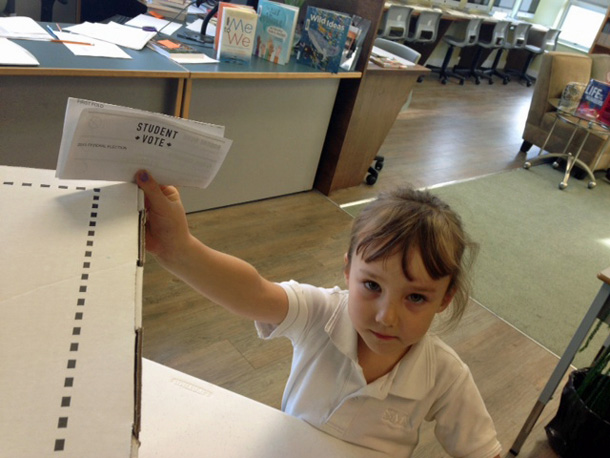Had students at St. Margaret's School been able to have their votes count in the recent federal election, they would have solidly picked Green party leader Elizabeth May to be their member of Parliament.
Students in Kindergarten to Grade 12 at the all-girls private school in the Victoria area riding of Saanich-Gulf Islands gave May 60 per cent support, only slightly better than the 54 per cent of votes May won in the actual election.
The students were among some 925,000 young people at 6,760 schools across the country to cast mock ballots as part of the Student Vote program run by the charity CIVIX, with support from Elections Canada.
The idea behind the initiative, according to its website, is to give future voters a chance to experience the democratic process and "practice the habits of informed and engaged citizenship."
Alice Brown, a 16-year-old in Grade 11 at St. Margaret's, said Student Vote also gives students a needed voice.
"I don't think it's that unusual to have youth be interested in what's happening in their country," she said. "We want to make sure our country is in good shape when we are the ones who are leading it."
Brown argued for releasing the Student Vote results before the country votes, instead of the current practice of releasing them after the election is over, and for lowering the voting age by two years to 16.
"Everyone should be looking toward what the youth had to say," Brown said. "If we're not allowed to vote, [the Student Vote result] should at least be out there so adults could take that into consideration."
Conservatives down, Greens up
Throughout Canada, students voted in similar patterns to the rest of the population, though not entirely the same.
The Liberals won 37.6 per cent of the mock student vote, the Conservatives 26 per cent, the NDP 19.6 per cent, and the Greens 12 per cent. While those results are similar to what the Liberal and NDP received in the actual election, Conservatives did about six per cent worse in the student vote.
The biggest difference was for the Greens, who won a portion of the votes three times larger from students than the 3.4 per cent they received from voting adults in the election.
Brown declined to say which candidate she supported, but said her choice was based on issues that included the economy, the environment and refugee policies. "You can't just have one question that decides your vote," she said.
A few Green party positions stood out for students, including promises of free university tuition by the year 2020 and lowering the voter age to 16, Brown said. There was almost no talk from the three major parties about lowering the voting age, which she supports, she added.
At 16 years old, a person is allowed to drive a car and can be tried in court as an adult, so it makes sense that they should also be able to vote, she said.
Asking pertinent questions
As part of the process, many schools invited election candidates to talk with their students. St. Margaret's hosted a forum with three candidates, while Elizabeth May and Conservative Robert Boyd made separate visits.
Sarah McLeod, a teacher librarian at the school who was involved in delivering the Student Vote program, was enthusiastic. "The students were so engaged and informed on the political parties, which I find fascinating," she said.
The students asked the visiting politicians pertinent, thoughtful questions that some of the candidates observed were as good as any they were asked by the general public during the campaign, she said.
While being carefully non-partisan, and not saying who she means, McLeod said that one of the visiting candidates spoke about being a woman in politics and what it means to be a citizen in a democracy in a way that strongly engaged the students. "You could tell by the speakers that one had a greater presence."
The program, which was free for schools, included ballots that looked real and had the names of the local candidates on them, official-looking ballot boxes, a resource package for teachers, lesson plans and online videos.
As Taylor Gunn, the co-founder, president and chief electoral officer of CIVIX told The Tyee, "The only thing that's un-real about [Student Vote] is kids are casting a ballot that won't count.... Everything else is almost identical to the actual election."
Given the high level of student engagement, McLeod said she'd advocate for lowering the voting age to 16, though she acknowledged any age is somewhat arbitrary.
"I would say the kindergarteners were just as engaged as the Grade 12s in their understanding of what was going on," she said.
Overall, some 83 per cent of the students at St. Margaret's cast a mock ballot, easily outstripping the 68.5 per cent of eligible voters who participated in the real election.
The participation and the enthusiasm bodes well for raising a future generation of engaged voters, McLeod said. ![]()
Read more: Education, Federal Politics

















Tyee Commenting Guidelines
Comments that violate guidelines risk being deleted, and violations may result in a temporary or permanent user ban. Maintain the spirit of good conversation to stay in the discussion.
*Please note The Tyee is not a forum for spreading misinformation about COVID-19, denying its existence or minimizing its risk to public health.
Do:
Do not: